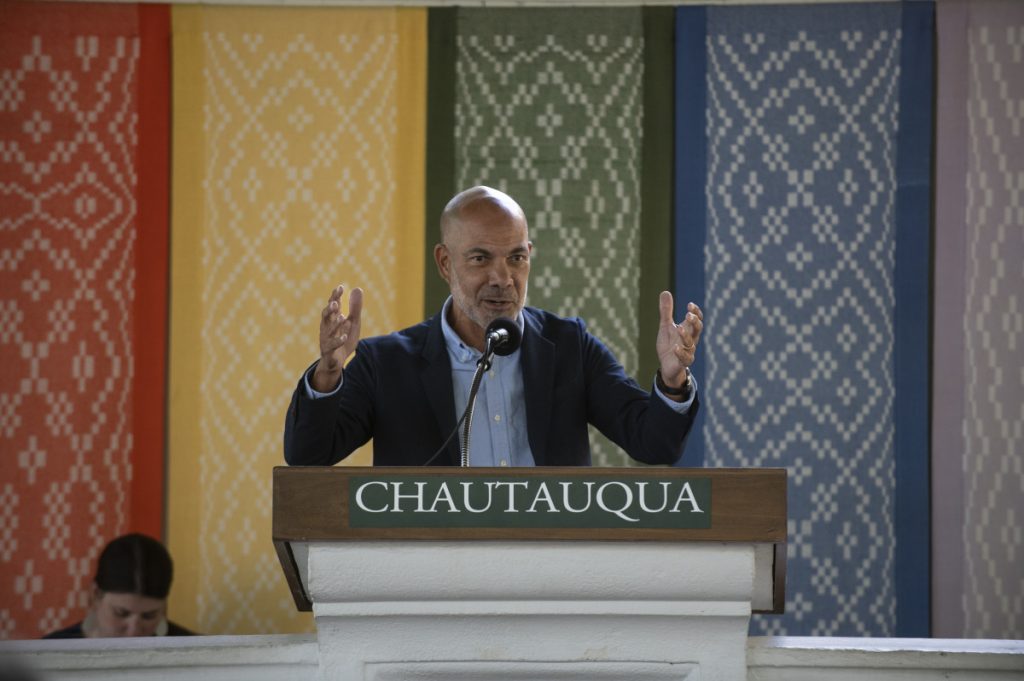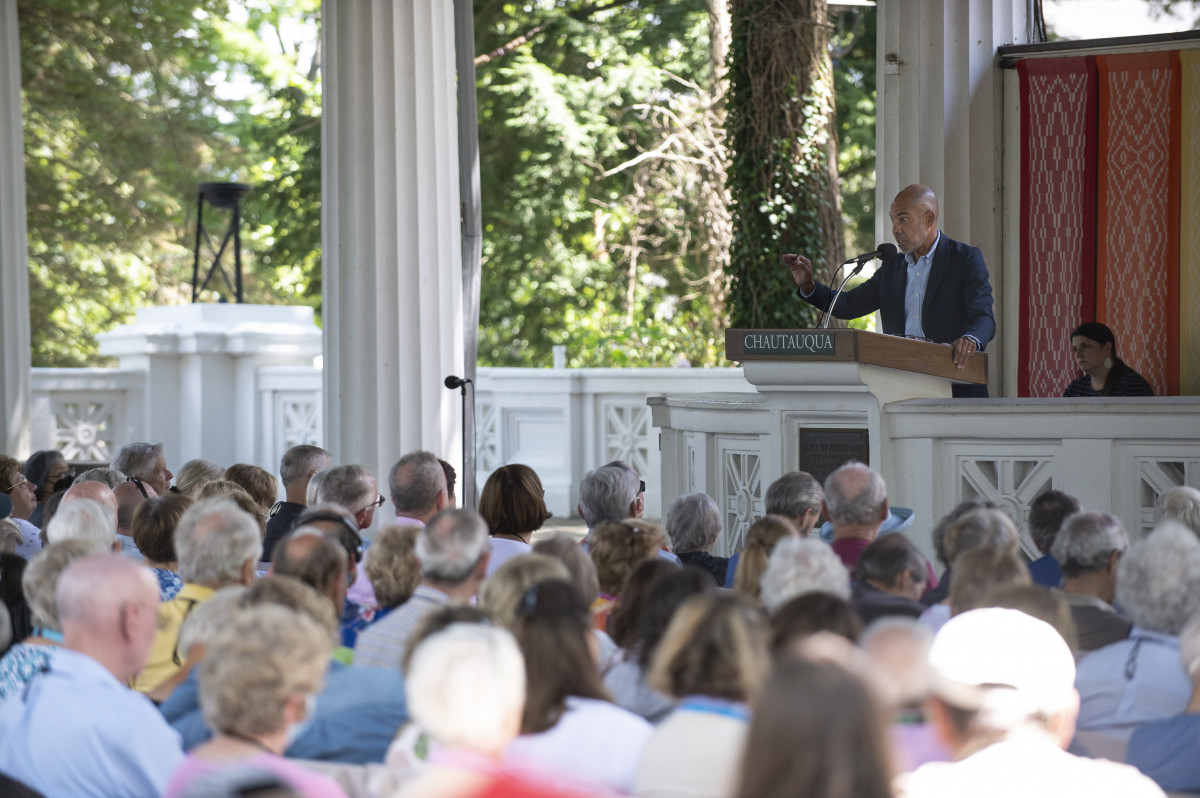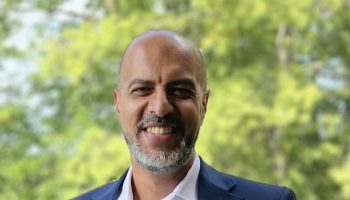In order for answers to reveal themselves, difficult questions must be asked. When discussing complex topics relating to politics, law and democracy, these questions are especially important to bring to the forefront, and they require deep reflection.
Sherman Clark’s Monday, July 25, lecture in the Hall of Philosophy, titled “What Democracy Demands,” included a multitude of such questions, aiming to get to the root of what can be done to save democracy. Clark opened Week Five’s Interfaith Lecture Series theme “The Ethical Foundations of a Fully Functioning Democracy.“
As the Kirkland & Ellis Professor of Law at the University of Michigan, Clark has experience teaching courses on torts, evidence and legal ethics since 1995. His current research is centered around the connection between politics, law, character and well-being.
Clark confessed that he did not have great wisdom to share with the audience, but rather questions. He first asked: “How, if at all, can our law and government help us as citizens nurture the capacities that democracy needs our citizens to have?”
Discussing the immediate, short-term threats and the structural, long-term issues American democracy is facing, Clark said he believes democracy is in a dangerous position.
“It’s evident that our democracy is struggling right now, and there are many components to that,” Clark said. “Every day, we open up a publication or news and somebody says, ‘Democracy is dying … our democracy is in trouble.’ And unfortunately, they’re almost all right.”
But even with these escalating problems, Clark said citizens are responsible for what democracy will become.
“Ultimately, we’re going to get the democracy that we deserve. We’re going to get the leaders that we vote for, and I think democracy won’t work unless citizens are up to it,” Clark said. “… Until we get better at talking to each other and listening to each other and understanding our system — and frankly, not being so easily bamboozled and frightened by marketers and politicians — democracy won’t work.”
Describing the current nation-wide model of democracy as a “great experiment,” Clark said other smaller forms of democracy have worked in the past. In ancient Greece, small democratic communities were able to come together and vote on decisions.
“We established … some version of republican democracy (that could) work on a slightly larger scale. … Still though, that was restricted very narrowly, and frankly, it was supported by an enormous, laboring non-voting slave population,” Clark said. “So what we established in the outset is that if you have a large population to do all the work for you, and you restrict the vote to a very few people, it can kind of work.”
But as history shows, this form of republican democracy was unfair and unsustainable.
This led Clark to ask: “Can democracy actually work in a really huge country, where we actually invest a certain amount of power in ordinary people?”
All fully functioning forms of government require those in power to be educated and hold certain responsibilities. But because a democracy provides citizens with this power, this inherently means that the citizens must possess these capabilities.
Clark believes that this power requires citizens to listen and learn from each other, as well as defy manipulation tactics implemented through marketers in a capitalist society. Yet these abilities are becoming more difficult to practice with the internet and social media.
While it can be inferred that these issues could be solved through better education, Clark argued that law and politics play a huge role in influencing how people act.
“(Law and politics) are, in various ways, inevitably constitutive of our character as citizens,” Clark said. “The way in which we structure our society, the responsibilities that we do or don’t put on each other, the rhetoric that we use when we run for office — those processes have an impact on the kind of people we become.”
Even though the government’s main role is not to nurture its citizens’ character traits, Clark said its current functions negatively impact people. So, he asked the audience what traits and capacities individuals in a democracy truly need.
While humans have a psychological calling that draws them toward simple stories that reassure their preexisting beliefs, Clark said people must resist this tendency. Often, the complex issues humans face have ambiguous answers.
Clark pointed to the structure of society to ask how law and politics can help build these necessary traits. Ensuring diverse environments, rather than homogeneous ones, would help people communicate with groups who are not like them. He said placing adequate funding and importance on education would also be beneficial.
When considering what impact political rhetoric has on society, Clark said whatever appeal a politician uses to get into office becomes ingrained in the citizens.
“So if I appeal to the fear and xenophobia of a particular group in order to get their votes, I have indirectly nurtured that in them,” Clark said. “Those are not traits that make for good democratic citizenship.”
Politicians running for office attempt to focus on what they believe the immediate crisis at hand is. But, they should also focus on what long-term effects will arise through their choices, Clark said.
Returning to two of his core questions, Clark pondered what specific traits need to be instilled in citizens and what can be done to nurture these traits.

“These inquiries, I think, are vital, and they are easy to ignore because right now we have lots of real crises going on,” Clark said. “… But what’s going to matter down the road is going to be just as much whether we’ve been able to nurture a citizenry that is capable of democracy, that is capable of talking to each other.”
Clark said citizens struggle to find a common ground of which capabilities need to be embraced, and pointed out that, due to manipulation through marketing, it has become more difficult to nurture these traits.
“The thing (marketers try to) sell us might not be good for us, but even the process of selling into us might be debasing us,” Clark said. “… We need to be sturdy enough not to let those processes debase us in the way that they tend to do because of the pressure to sell us whatever we’ll buy.”
The last obstacle Clark touched on was democracy’s cultivation of an anti-elitism attitude. Because the Constitution says, “All men are created equal,” it’s implied that all citizens, despite traits and capabilities, are able to make important decisions through voting.
“(This declaration in the Constitution) tends to make people think that their uninformed opinion is just as good as your thoughtful knowledge,” Clark said. “… Democracy tries to make citizens smarter and more capable, which it can really sound — and maybe to some extent is — elitist.”
Citizens can combat this by challenging the psychological habit of oversimplifying what their responsibilities entail. With this, Clark believes improving democracy by holding citizens accountable can backfire if it is not handled with genuine respect for the people.
“So a cautionary note would be we’re up against (a precarious democracy) because the forces of capitalism and democracy indirectly cultivate, not the traits that democracy needs, but the traits that they need for consumers and voters,” Clark said. “The project is rendered difficult because the very spirit of democracy rebels against the idea that people need to be made in any way smarter or better or educated.”
While Clark views creating a long-lasting, fully functioning democracy as a long-term process, he said it may not be the correct solution in the face of so many immediate crises.
“It may well be that my friend and mentor, James Boyd White in Michigan, has it right when he says that the way that we’re going to cultivate … the capacities that democracy needs, is not figuring out theories and writing papers,” Clark said. “It’s going to be in our small interactions with each other. It’s going to be … in the way we treat each other, … (and in how) each of us nurtures the capacity to find and bring … the traits that we need. Maybe that’s the way we’re going to make progress, rather than in some larger way.”





